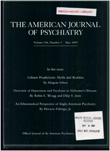Expressed emotion: from predictive index to clinical construct
Abstract
Expressed emotion, a measure of family attitudes toward psychiatric patients that is predictive of relapse, has attracted renewed attention recently as interest in the chronic psychiatric patient has widened. The authors review the development of the concept and the limits of its meaning. In seeking the core clinical construct underlying the expressed emotion variable, the authors also review recent studies of the relationship of expressed emotion to family interaction patterns, physiological arousal states, precipitants of relapse, and parental personality style. While family intervention studies are necessary to demonstrate that expressed emotion influences outcome in psychiatric patients, methodological limitations in currently available studies leave this issue unresolved.
Access content
To read the fulltext, please use one of the options below to sign in or purchase access.- Personal login
- Institutional Login
- Sign in via OpenAthens
- Register for access
-
Please login/register if you wish to pair your device and check access availability.
Not a subscriber?
PsychiatryOnline subscription options offer access to the DSM-5 library, books, journals, CME, and patient resources. This all-in-one virtual library provides psychiatrists and mental health professionals with key resources for diagnosis, treatment, research, and professional development.
Need more help? PsychiatryOnline Customer Service may be reached by emailing [email protected] or by calling 800-368-5777 (in the U.S.) or 703-907-7322 (outside the U.S.).



